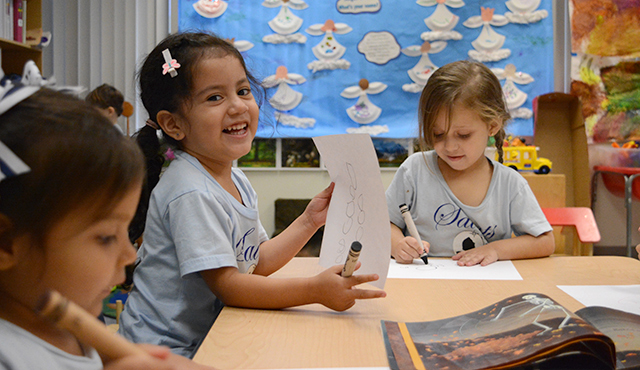“Start children off on the way they should go, and even when they are old they will not turn from it.”
—Proverbs 22:6
Teachers and parents must teach their kids the value of sharing, the importance of knowing how their actions affect others, and why thoughtfulness is so important for Christ-like living.
A sense of social responsibility furthers the Catholic belief that the other person is as valuable as I am and deserves respect as an individual and someone who is loved by God, says Principal Brad Snyder of St. Joseph School, a Catholic preK-8th grade school in Santa Ana.
“We talk about Catholic social justice and we start at the beginning with 4-year-olds,” Snyder says. “We do it through our religion classes and the stories we tell from the Bible about the Good Samaritan and how we take care of our neighbors.”
Because St. Joseph’s students come from very diverse, impoverished backgrounds, Snyder says it’s important that they learn how to be there for each other, and how they can look beyond themselves to be the change they want to see in their community.
Teaching children values can begin when they are still quite young, agrees Louise Valdez, faith formation coordinator for St. Junipero Catholic School in Rancho Santa Margarita, which has more than 1,000 PreK-8th grade students.
“As an educator, I start at the beginning and, knowing the stages of development, ask ‘where is this child right now as far as their viewpoint?’” Valdez says. “It is critical because we are a Catholic school to also assess where they are in relation to God.”
Elementary school students are learning as youngsters that two-way relationships are beneficial. “If I’m nice on the playground, others will be nice to me,” Valdez uses as an example. “You can’t start too early to teach kids to be empathetic with each other.”
Teaching kids empathy is vital, Valdez notes, referring to “The Blessing of a Skinned Knee,” in which author Wendy Mogel uses Jewish teachings to teach parents to raise self-reliant children. “It talks about how our mission of perfection sets our kids up to fail and encourages parents to let their children be unique and ordinary.”
From a Christian point of view, Valdez notes, parents and educators must be channels of grace. “God is constantly communicating His grace through us so we can share it. He shows us how to be charitable to others, give each other hope, and pray over others. No child is too young to participate in that, to learn to be a channel of grace.”
Praying as a family at every opportunity and counting blessings together teaches kids that their needs are part of the family’s priorities.
In elementary school, Valdez says, kids see that everyone wants to be valued. “When the teacher is praying, they light up because they know those prayers from praying at home and they want to lead them.”
Learning the parts of the Mass introduces children to the concept that much of the Catholic faith is tradition. “Explaining tradition and teaching them to understand faith is important. It also can be difficult. Sometimes parents don’t understand presence of Jesus themselves.”
Valdez notes that all of us need to be involved in some way in someone else’s life. “Middle school is the perfect time to open students’ eyes to service,” she says. “By taking advantage of service opportunities, such as participating in delivering food to the homeless or visiting a facility for the elderly, we teach children about the important of being aware of other people.”

